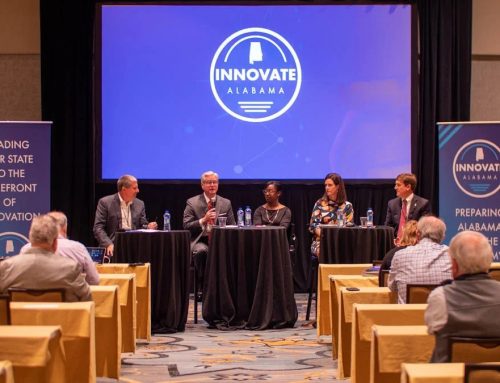Montgomery’s past is packed with world-changing events, and now, the city is making history again, this time in an unexpected way: Montgomery is quickly making a name for itself as one of the Southeast’s most vibrant and most strategic “cyber cities.”
By leveraging its large collection of resources and pooling talent, Montgomery is growing into a tech hub that will foster innovation and create jobs, Joe Greene, the Chamber’s VP for Military and Innovative Strategies, explained. “We have unique assets here in the River Region,” he said. “There is no other place in the country that has all of the Department of Defense (DoD) assets we have located in one spot. That makes us the perfect location to become a cyber leader for the Air Force and to create a common DoD/commercial infrastructure that becomes a virtual sandbox for cyber Innovation.”
MORE THAN MILITARY
Both Maxwell AFB and Gunter play major roles in the Air Force’s and our entire military’s cyber defense and cyber strategies efforts, and the effects of this spill over the bases’ borders into the rest of the area. “The Defense Information Systems Agency datacenter, located on Maxwell-Gunter, stores all of the electronic medical records for the entire Department of Defense. It is the largest Oracle database in the world. It is also one of only two military cloud datacenters for all of the DoD,” Greene said. Plus, the Program Executive Office for Business Enterprise Systems develops, acquires and sustains all of the applications for the Air Force globally, and the 26th Network Operations Squadron operates and defends the Air Force network worldwide. “With these missions combined with Air University and the recently established Air Force Cyber College, you have a convergence of Air Force tech and cyber talent from all over the world gathering right here,” Greene said.
In the private sector, the new RSA Data center, which is one of the most sophisticated in the country, and the MGMix Internet Exchange are crucial pieces of the equation. Plus, add the city’s five universities and a strong city-county partnership, and the stage is set for what Greene and others believe will be some exciting progress in the next few years, progress that will bring positives to everyone in the area. “All these elements give us a huge knowledge base and a lot of capability, and put together, they create a pretty powerful synergy in terms of cyber and technology,” said Carl Barranco, the City of Montgomery’s new Cyber Coordinator. “The way we are using them will come into play for every one of us, for all of our day-to-day activities as it moves forward. It is not just the military; it’s not just business. It’s for everyone.”
THE BIG PICTURE
The picture Greene and Barranco paint is impressive, but how do all these things bring new businesses and help existing companies? According to Greene, in several ways. “Because of groups like hackMGM, we have the opportunity to develop these ideas into new businesses and new jobs,” he said. “And the internet exchange aids current and existing businesses by significantly reducing what they pay for internet services.” The internet exchange is already delivering cost savings. Several State of Alabama entities have connected to the exchange and cut their spending by two-thirds, translating into nearly $14,000 a month saved.
Jason Asbury, President of Warren Averett Technology Group, shares Greene’s sentiments on the bottom-line benefits of MGMix. He offered a few other positives too. “It has already brought more players to the area as it relates to carrier service options. More providers equal more competition and lower prices with better and faster services. Big name providers like Hurricane Electric and Akamai have seen the value of our exchange, and they have invested in our technical community. This brings faster access to the rest of the world, and it better secures our Internet experiences,” he said. “Additionally, as the exchange grows, there will be increased opportunities for low-cost data sharing and storing of Open Source information. These benefits are the beginning of a new era of IT jobs and services that the River Region will have to offer to our residents and businesses. Our future is bright and the MGMix is adding to the shine.”
Tobias Mense, Chief Information Officer at Auburn University at Montgomery, the first university to join the internet exchange, echoed Greene and Asbury as he outlined why AUM connected. “We believe things like the exchange will positively impact the city, and we want to play a role in moving Montgomery forward,” he said. “We also wanted to take advantage of benefits it offers, like cost savings and faster speeds.”
AUM is now using Hurricane Electric, one of the new companies that came to Montgomery because of the internet exchange, and has seen its costs go down by more than 80 percent. It’s about more than saving money. Thanks to the exchange, the capacity for data transmission is higher too, since companies and organizations are directly connected to the backbone of the internet. “Your business can run faster, download and upload information quicker, deliver content faster and therefore, be more efficient,” Greene said. In some instances, it offers increased security as well.
Intangibles like an improved image for the city can become tangible when that image bolsters economic development efforts. The ability for greater capacity should translate to new jobs. “That alone will help us attract companies in the advanced manufacturing industry here,” Greene said. Barranco agrees. He sees MGMix and the city’s other tech resources as essential to the city and county’s continued success in wooing new businesses here and spurring expansion in existing industry. “If you aren’t attuned to what is going on in technology, you are slipping behind,” he said. “You have to stay ahead of this game, and it is changing fast. We know that real economic impact and job creation are based on us explaining and promoting the city’s tech resources. That’s how we’re making ‘TechMGM’ a reality.”
The MGMix hit 100-gigabyte capacity in June; an impressive and important milestone. But Barranco stressed that there’s no time to rest. “We now need to attract more internet service providers, more content providers and then connect more businesses to the exchange,” he said. And while the initial focus has been on businesses, all the benefits trickle down. “All of these advancements let us improve services that the state, county and city provide its residents,” Barranco said. “Things like open data, where the public has more access to information. It will also help us improve our visitors’ experiences, so it helps tourism, which brings in tax dollars. It really is a win-win for us all.”
Cyber COLLEGE
With 90 percent of its personnel coming to study at Maxwell AFB’s Air University (AU) at some point, AU is clearly the center of education for our nation’s Air Force. It now has a new tool to train our current and future airmen: the Cyber College. In planning stages since 2014, and just becoming “official” this past June, the Cyber College is moving the Air Force from the industrial age to the information age and equipping its students with the operational knowledge and strategic insights to fight potential cyber attacks.
“Two and a half years ago, General Kwast had a vision for starting the Cyber College because while the United States is a premier cyber actor, it has been slow to integrate cyber power into the national level of thinking,” said Commandant Clinton Mixon, the College’s senior military member. “Other countries like Russia and China have put much more emphasis on cyber power,” added Dr. Pano Yannakogeorgos, the dean of the Cyber College.
Its reach already extends far beyond Maxwell. Yannakogeorgos and his team instruct the air forces of other countries—like the Royal Air Force— and global organizations like NATO.
With the realization that, as Kwast often says, “Cyber [and cyber security] is a wicked problem that can’t be solved, but only made better,” the Cyber College is doing more than educating the military, it’s also trying to teach our country in general how industrial cyber processes can be hacked and how the results of such an attack would be just as devastating as weaponized cyber power. While there are no fulltime Cyber College students yet—its courses are currently electives for ACSC and Air War College students—that will soon change. The students who’ve participated and are currently taking its courses spend a good percentage of their time doing research and getting papers published.
But the Cyber College isn’t only playing defense. The topics and ideas being studied there relate to and can aid in the use of more technology for “smart cities,” things Montgomery officials and Chamber leaders are pushing for like smart city vehicles, optimized trash collection and more. The city and county are also able to take advantage of relationships the Cyber College has formed with major tech players like AT&T, HP, Microsoft and Verizon.
Simply the existence of the Cyber College in Montgomery is a positive; its presence here contributes to the goal of being known as a “tech-hub,” and its courses will bring external and internal expertise to Maxwell-Gunter. “We are advocates for the city and talk about its tech focus and capabilities everywhere we go,” Yannakogeorgos said.
The college is currently working with academic institutions like Auburn University, Harvard, MIT, and NDU and wants to work with local schools like AUM and Alabama State University in future. “We’d like to send our students to local universities to take advantage of the expertise of instructors there and not have to offer duplicate courses,” Yannakogeorgos said. “And we’re brainstorming ways to allow university students, state and local government officials to come and participate in seminars on base, but it may not be possible to do so from a security perspective.”
TRAINING OUR TECH WORKFORCE
While connecting existing tech resources and creating the system needed to support their growth and expansion is important, as these efforts create an economic catalyst and new job opportunities follow, we’ll need more and more people to fill them. Building a qualified tech workforce is a primary focus of the plan put into action by the city, county, The Chamber and their partners. “We need to provide the right education for this movement. What the city is doing now with Cyber Coordinator Carl Barranco at the helm is bringing all of these pieces together—all our tech businesses, other government entities, our universities and Maxwell-Gunter—and it’s putting us on the right track,” said Tobias Mense, Chief Information Officer at AUM. “These efforts are creating spaces for young people to hone their tech and programming skills and that is really positive,” he said. AUM is doing its part to get its students ready too. “We’re looking at our offerings to make sure we have the relevant degrees and ensuring our students have bright employment prospects,” he said.
FILLING A NEED
Charisse Stokes, president of Tidal IT Solutions and part of the Chamber cyber innovation team, echoed Mense. “We need a better qualified IT workforce here,” she said. Some of the River Region’s largest companies, like healthcare providers and Hyundai, are always looking for IT talent, and many times these jobs go unfilled. “In the past, there have been jobs we have had to recruit from outside of the River Region for because we don’t have enough people with the right skill sets, certifications and/or degrees to satisfy all the requirements,” Stokes said. “We are fixing that.”
CYBER ACADEMY
According to Stokes, the solution is to complement our education system by offering additional certification courses and also offering continuing education within our current universities as well as with alternative methods. That’s exactly what the Cyber Innovation Academy, which held its first classes last spring, is doing. Hosted by The Chamber, the Academy helps area companies get their employees up to speed on IT, which is continually changing. It helps companies fill their IT needs, but also helps workers advance in their careers, and helps its students who are currently looking for a job gain the skills and certifications they need to compete. “We’re working closely with area employers to find out what the demand is so we can teach what they need,” Stokes said.
The Academy has partnered with the Alabama Community College System and Trenholm State Community College, but is also looking to work with ASU, AUM and Troy University too and use those institutions’ expertise to help it teach coding and programming courses, software and app development, and networking courses. “Those could be taught to augment and supplement larger degree programs,” Stokes said.
MAKING THE GRADE
Currently, several different course structures are being offered, and Stokes pointed to the Academy’s flexibility. “We want to adapt to the needs of the market and respond quickly to meet those needs,” she said. In June, the first 15 Cyber Innovation Academy students finished their first course, an eight-week CompTIA Security+ class. In July, when Academy leaders went back to businesses and asked again what they needed, they found that many didn’t want to wait eight weeks for employees to finish a course. “So now, we’re offering some four-week options,” she said.
The Academy is already seeing growth, and that’s good news, as Stokes stressed. “It is a huge piece of the tech and cyber revolution happening here,” she said. “It arms our workforce to get the jobs coming available locally and helps businesses already here, hire here, instead of bringing others in. Plus, when new businesses look to come here or existing businesses get ready to grow here, we are a component they can look to for help in filling the jobs they need to fill.”
WHAT THE TECH SCENE MEANS TO YOU
SMALL BIZ BENEFITS
The Air Force’s Cyber College is bringing its message and expertise to area businesses and residents. Yannakogeorgos and Mixon often give presentations at local social clubs and are mentoring high school students at The Montgomery Academy, Saint James School and Wetumpka High School through the Cyber-Patriot Program that tests the students in hacking competitions.
They have also partnered with the Chamber to host a Cyber Opportunities Forum where they discussed topics like cyber security and how small- and medium-sized businesses in Montgomery can do more—and more lucrative— business with the government.
OTHER WAYS ADVANCES IN TECH HERE CAN HELP YOU:
- COSTS FOR INTERNET SERVICES ARE GOING DOWN
- AS MORE TECH COMPANIES COME IN, THE DEMAND FOR PRODUCTS AND EXPERTISE FROM LOCAL SMALL BUSINESSES TO SERVE THEM GOES UP.
- DOWNTOWN, FREE WI-FI IS NOW AVAILABLE, THANKS TO THE RIVERFRONT DEVELOPMENT FOUNDATION’S PARTNERSHIP WITH WIND CREEK MONTGOMERY.
Plus, businesses’ and the public’s access to all kinds of information thanks to improved “open data” will be faster and more accurate than ever before. THINK CONSTRUCTION PERMITS AND INTERACTIVE CHARTS.
Dollars and Sense – How Tech Adds Up
- 5,000Annual attendees at Air Force Information Technology and Cyber Power Conference (AFITC) (the military’s largest IT conference).
- $5-7 MillionAnnual Economic Impact of AFITC
- 1,825Number of IT/cyber contract jobs supporting the IT missions at Gunter
- $750 MillionEconomic impact of IT/cyber jobs in the River Region associated with Gunter
- Several State of Alabama entities have connected to the exchange and cut their spending by two-thirds, translating into nearly $14,000a month saved.
- LARGEST ITEMPLOYER IN OUR AREA: The Department of Defense
SMALL BUSINESS SOLUTIONS: SAFE & SOUND
With businesses’ increased reliance on technology, there are specific threats that make IT security paramount. One major challenge is data loss. Nobody wants to lose information, but for a small business, a tech issue that destroys data can lead to business interruption and revenue loss that could prove catastrophic. Michael Lange of ABS Technology, a local full range IT services company, offered this advice. “Small businesses need to have strong data backup procedures in place,” he said. “We strongly advocate for both onsite and cloud-based backup processes. Many customers we’ve worked with learned too late that their backup was not working or was inadequate requiring an attempt to recover critical business data. And it is important to have a plan in place so that if something happens to the business’ physical building, the data is protected and recoverable enabling the business to resume operations in a reasonable time frame.”
INCREASED THREATS
Jason Asbury, President of Montgomery- based Warren Averett Technology Group, pointed to how “security-centric” IT services for businesses have become and outlined why. “Technology has advanced so significantly with the advent of virtualization and better public and private cloud offerings,” he said. “Subsequently, more and more data is being generated, and that has resulted in greater opportunities for the ‘bad guys’ to hack, steal and wreak havoc on operations. Security and risk management are at the forefront of concern for business leaders.”
This is one reason companies like Warren Averett Technology Group are growing, but only those who truly have the needed expertise will continue to thrive. “The problem with properly managing risk is that a vast array of tools and security layers are required to do the job right,” he said. “Business communities have a real and urgent need for IT service providers with the expertise to secure systems and prevent data loss.”
SMALL BIZ—BIG TARGET
Shaw Technology, a full-service managed service provider with emphasis on security, disaster recovery and long-term infrastructure reliability, is currently the largest privately owned IT firm in the state. According to owner Brad Shaw, all businesses face tech challenges related to security, but small businesses can be at particular risk. “Most wouldn’t think it, but small businesses are targeted by hackers and ransomware more than any other businesses because the assumption is that they don’t have the correct IT in place and for the most part, that is true,” he said.
He stressed that this lack of preparedness is not due to incompetence. “Generally, small businesses are formed by entrepreneurs that specialize in a particular area. They are constantly making sure to take care of their customers. But while they’re handling all of that, the world continues to change and demands rise,” he said. “The solution is having someone take care of IT for you, so you can take care of your business. We secure the network so they don’t have to worry with these things. It’s not like it used to be in the past where IT was a luxury. A strong IT group, these days, is the difference between thriving and struggling.”
IT Success Story
Montgomery-based Integrated Computer Solutions (ICS) celebrated 20 years last March, and this veteran-owned small business is one of the city’s brightest IT sector success stories, a truly pioneering company that launched out of the Chamber’s Small Business Incubator. In the last two decades, ICS has experienced tremendous growth, bringing its IT consulting, application development and cyber security services to its many clients, including both the DoD and the Air Force as well as many state governments and commercial enterprises throughout the country. “We were doing cyber security before it was cool,” joked Chip Schuneman, ICS’ Chief Operating Officer.
Keeping data and communications confidential and safe is how the Defense Information Systems Agency (DISA), one of the key components at Gunter, came into being, and ICS was “intimately involved” in its founding and remains involved. In fact, DISA is one of ICS’ largest clients. “We are the prime contractor for a nearly $70 million contract in support of DISA,” Schuneman said. The company also serves Montgomery’s two largest employers, state government and Maxwell-Gunter AFB.
ICS will continue to grow and progress alongside the growth and changes of technology in general. “Technology has evolved immensely,” Schuneman said. “Everyone is connected all the time. That was not the case 20 years ago, so that has moved us from a centralized to a de-centralized approach to serving our customers’ tech platform.” But in the end, traditional business wisdom still applies, even for cutting-edge companies. “The fundamental thing about ICS is that we are a services company, so the quality of the services we provide are what matter, regardless of technology and the tools we use,” Schuneman said.






Leave A Comment